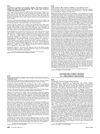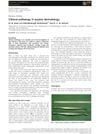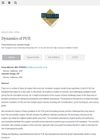 August 2015 in “Dermatología Argentina”
August 2015 in “Dermatología Argentina” Frontal fibrosing alopecia causes hairline recession and eyebrow loss in postmenopausal women.
 1744 citations,
August 2006 in “The Journal of Clinical Endocrinology and Metabolism”
1744 citations,
August 2006 in “The Journal of Clinical Endocrinology and Metabolism” Polycystic Ovary Syndrome should be seen mainly as a condition of excess male hormones, with a focus on this in its definition.
[object Object]  1540 citations,
October 2008 in “Fertility and Sterility”
1540 citations,
October 2008 in “Fertility and Sterility” The report concludes that PCOS is mainly a condition of excess male hormones and its definition may change as new information is discovered.
 106 citations,
April 2010 in “ACS Nano”
106 citations,
April 2010 in “ACS Nano” C60 fullerenes can alter protein function and may help develop new disease inhibitors.
 103 citations,
December 2011 in “Journal of the American Academy of Dermatology”
103 citations,
December 2011 in “Journal of the American Academy of Dermatology” Chemotherapy often causes temporary hair loss, which is distressing and needs better treatment and support.
 97 citations,
July 2006 in “Dermatologic therapy”
97 citations,
July 2006 in “Dermatologic therapy” The document concludes that accurate diagnosis and personalized treatment are important for skin problems in women with PCOS.
 72 citations,
January 2011 in “Current Pharmaceutical Design”
72 citations,
January 2011 in “Current Pharmaceutical Design” S5αR inhibitors might help treat schizophrenia and other mental disorders but need more research.
 20 citations,
January 2016 in “Intractable & Rare Diseases Research”
20 citations,
January 2016 in “Intractable & Rare Diseases Research” Combination therapy, especially with finasteride, is effective for treating frontal fibrosing alopecia.
 19 citations,
January 2007 in “Dermatology”
19 citations,
January 2007 in “Dermatology” Unwanted facial hair significantly impacts over 40% of women's psychological and social well-being, and various treatment options are available.
 14 citations,
August 2018 in “Nanoscale Research Letters”
14 citations,
August 2018 in “Nanoscale Research Letters” Turmeric may improve knee osteoarthritis, depression, and metabolic syndrome, but evidence is weak.
 13 citations,
July 1996 in “Annals of Internal Medicine”
13 citations,
July 1996 in “Annals of Internal Medicine” International medical graduates outperformed U.S. graduates on an internal medicine exam.
 7 citations,
December 2020 in “Clinics in Dermatology”
7 citations,
December 2020 in “Clinics in Dermatology” Some alopecia treatments might help treat COVID-19, but more research is needed.
 6 citations,
June 2018 in “PLOS ONE”
6 citations,
June 2018 in “PLOS ONE” The Alopecia Areata Assessment Tool (ALTO) effectively identifies alopecia areata from other hair loss types but needs more validation.
 4 citations,
September 2011 in “American Journal of Clinical Dermatology”
4 citations,
September 2011 in “American Journal of Clinical Dermatology” Ethinylestradiol/chlormadinone acetate may be an effective and well-tolerated treatment for skin conditions caused by excess androgens.
 3 citations,
October 2015 in “Human Psychopharmacology-clinical and Experimental”
3 citations,
October 2015 in “Human Psychopharmacology-clinical and Experimental” Finasteride doesn't affect sleep spindles in men.
 2 citations,
January 2006 in “Technical report”
2 citations,
January 2006 in “Technical report” The document concludes that better tools are needed to measure skin disease severity in dermatomyositis and cutaneous lupus erythematosus, and introduces the DSSI and CLASI as reliable instruments.
 1 citations,
October 2023 in “Life science alliance”
1 citations,
October 2023 in “Life science alliance” Pantethine may boost the immune system's ability to fight sarcoma.
[object Object]  June 2016 in “CRC Press eBooks”
June 2016 in “CRC Press eBooks” Sleep problems and skin issues affect each other; poor sleep can worsen skin conditions, and some skin treatments can improve or harm sleep quality.
 February 2009 in “Journal of The American Academy of Dermatology”
February 2009 in “Journal of The American Academy of Dermatology” Atopic dermatitis significantly lowers the quality of life for infants and their families.
 April 2016 in “Journal of The American Academy of Dermatology”
April 2016 in “Journal of The American Academy of Dermatology” Different treatments are effective for hair loss conditions, but results vary by individual factors.
 April 2016 in “Journal of The American Academy of Dermatology”
April 2016 in “Journal of The American Academy of Dermatology” A vitamin and mineral supplement significantly reduced hair shedding in Brazilian women with telogen effluvium.
 July 1996 in “Annals of Internal Medicine”
July 1996 in “Annals of Internal Medicine” In 1995, international medical graduates did better than U.S. graduates on a medical exam.
 1 citations,
June 2016 in “Equine Veterinary Education”
1 citations,
June 2016 in “Equine Veterinary Education” The document concludes that using the right diagnostic methods and careful sample handling is crucial for accurately diagnosing horse skin diseases.
 1 citations,
July 2015 in “Cambridge University Press eBooks”
1 citations,
July 2015 in “Cambridge University Press eBooks” Testosterone therapy can improve sexual function in women but long-term safety is unclear.
 July 2015 in “Cambridge University Press eBooks”
July 2015 in “Cambridge University Press eBooks” The document concludes that careful history and physical exams are crucial for accurately diagnosing polycystic ovary syndrome and distinguishing it from other similar conditions.
 5 citations,
November 2017 in “Hair transplant forum international”
5 citations,
November 2017 in “Hair transplant forum international” Following a standard process for FUE hair transplants leads to consistent results.
3 citations,
June 2017 in “The Journal of urology/The journal of urology” Older men with postoperative urinary retention are more likely to need future bladder procedures.

Changes in gut and skin bacteria are linked to different hair loss conditions, and treatments like fecal transplants and probiotics might help, but more research is needed.
 January 2020 in “Przegla̧d dermatologiczny”
January 2020 in “Przegla̧d dermatologiczny” The conclusion is that hirsutism in women can be managed with hair removal techniques, medications, and topical treatments.
 May 2024 in “Pigment International”
May 2024 in “Pigment International” Several treatments are effective for pigmentary disorders like vitiligo and melasma.





























